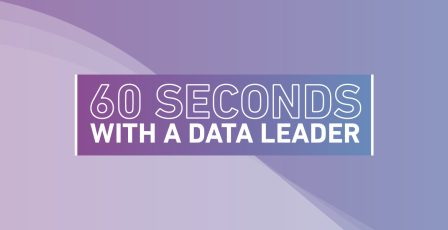60 seconds with a data leader: Heather Dawe, Chief Data Scientist at UST
Welcome to 60 Seconds with a data leader — a series where data leaders uncover their journeys, perspectives, and insights on the ever-evolving world of data
In this edition, Heather Dawe, Chief Data Scientist and Head of Responsible AI at UST, shares her journey into data and technology, the excitement of innovating with AI at scale, and the importance of diversity in tech leadership. She also explores the future of data, and the human skills needed to thrive alongside AI.
Q1
What inspired you to pursue a career in data and technology?

At university, I studied Maths and was always fascinated by the ways you could predict the future using data and probability theory. When I left university, I started working for IBM as a software developer and designer—this was 25 years ago. After a few years in the role, I began exploring how to combine big data with analytics and machine learning within software.
I essentially became a data scientist before the term was widely used. Since then, I have innovated new data science and AI products across various industries in both the private and public sectors, building data science and AI teams along the way.
Q2
What’s a day in your life as a Chief Data Scientist at UST like?

It is very varied. A few weeks ago, I was at the World Economic Forum in Davos, participating in a panel discussion on AI ethics. Last Friday, I visited a school in West Yorkshire and spoke to an assembly of pupils about the roles of technology they could pursue in the future.
While I do enjoy speaking about AI and broader technologies, most of my time is spent liaising with our clients—large UK, European, and global enterprises—in various ways. I aim to ensure that we strategies and develop roadmaps, services, and products that help them achieve their goals with data and AI. I also mentor our teams to deliver and innovate.
Q3
What’s the most exciting part of your role?

There are a lot of things about my job that excite me. I personally love to innovate and help people to gain value from data and AI – in my job, I do this at scale. And AI is moving so fast – it’s exciting to work with large businesses, helping them to succeed with what is a multi-faceted technology that is changing our ways of working and living.
Q4
What do you enjoy most about working at UST?

UST has a very innovative and kind culture. We work together to solve problems and build solutions for our clients. The thing I enjoy the most is this environment – anyone with a good idea will be listened to and encouraged.
Q5
What’s one decision or initiative you’re most proud of in your leadership role?

I’m a champion of diversity in data science and AI teams, and in technology in general. At UST, I’ve been encouraged and helped to build such teams.
I’m not sure, from a global perspective, if it’s ever been important for women leaders in technology to be proud of what we do, how we do it, and our achievements. We need to stand tall, show ourselves, and help the next generation of diverse leaders to come forward. This isn’t always easy for a natural introvert like me!
Q6
How has the role of data evolved since you started your career?

Data has evolved tremendously. I was there at the beginning of data science. For many years, it was challenging to convince businesses to invest in data, analytics, data science, and AI. Although the ROI was there, it was often complex and challenging to achieve, leading to hesitancy in investment.
Nowadays, businesses appreciate that there is value to be gained in data and AI. You still – of course, rightly – need to form the business case for change and investment, but many more people are seeing that data and AI used in the right ways can be transformational.
Q7
How do you see the role of data and AI evolving in the next 5 years?

I don’t think the pace of AI development will slow down in a hurry on a global level. This means that enterprises will need to keep a focus on their data if they are going to be able to unlock the value it holds, if it’s managed and developed in the appropriate ways.
Nowadays, data and AI are strategically very important, and we’re seeing the role of the Chief AI Officer emerging. It will be interesting to see if Chief Data Officer roles evolve to encompass this or if they develop separately.
Q8
How do you stay ahead of emerging trends in data and technology?

I started off as a software developer and I still code and make apps. These days, I am so excited to be using AI to code – I can build a prototype AI app in less than a day that would have taken me three weeks or more just a few years ago. And when I get my prototype app working, I have an amazing time innovating new solution, integrating the use of AI with my own creativity.
AI is changing software development, data science, and wider ways of working; using AI and continuing to code helps me to keep imagining new products and services powered by data, ML, and AI.
Q9
If you could give one piece of advice to someone starting out in a data-related role, what would it be?

The one piece of advice I’d give to anyone starting out in a data or wider technology role now is to develop your critical thinking and problem-solving skills and to pursue some kind of creative activity that will help you to connect with your intuition and creativity. As we increasingly work with AI, it will do much of the routine, process-based work as well as some of the new development.
I think this will be in partnership with us – we will bring the uniquely human intellectual traits that AI cannot (currently, at least) do. Our capacity to critically review business problems and develop innovative ways of doing things will be major assets in future ways of working.
Thank you for joining us for this insightful Q&A with Heather
Stay tuned for more expert insights in our next edition of 60 Seconds with a Data Leader. Speak to our team if you’d like to find out how our data quality solutions can help you unlock the full potential of your data.










